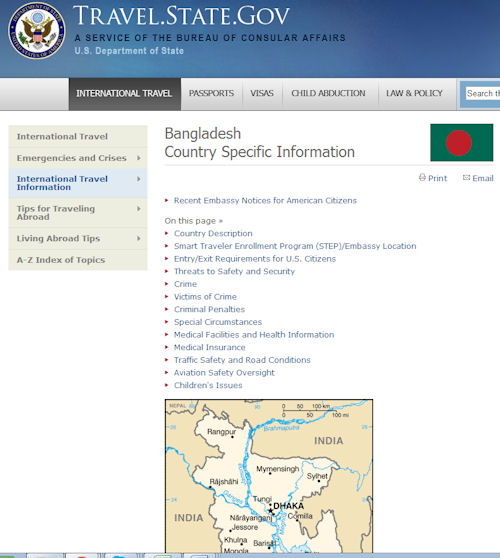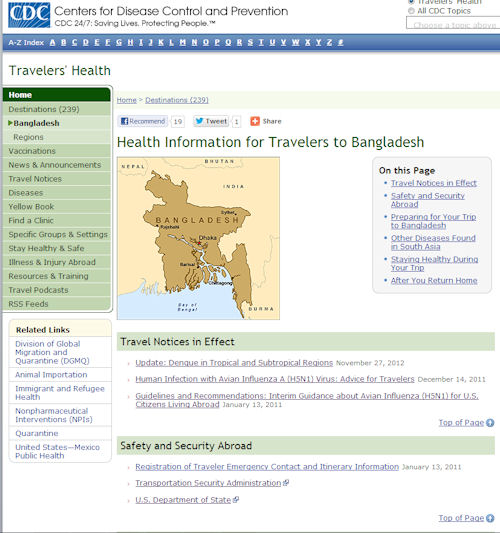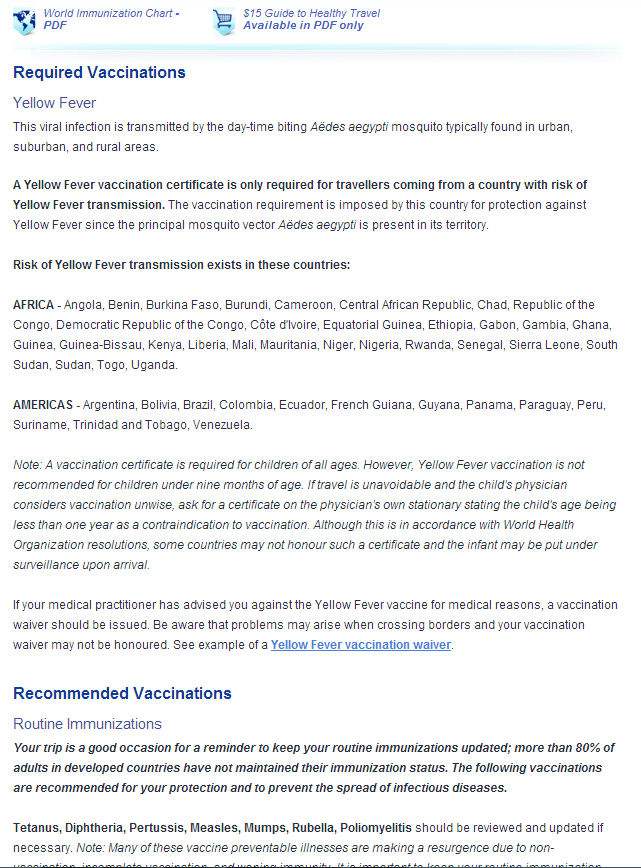3 Places for the Best Travel Health and Safety Info
8 March 2013
Many travelers like to know what kinds of risks they’ll face when traveling to a particular region, so we decided to research the best places to find the latest travel health and safety information.
We found three websites that organize the information in a useful way too; i.e., we wanted to be able to select our destination, or destinations, and read everything that’s currently worrisome in that area.
Here are the top 3 places to find current travel health and safety information:
1. Travel Safety? See the State Department website
The U.S. State Department website has some great stuff, right on the home page – current travel warnings and alerts, current information for international travel, passports, visas, and information about traveling with children and family.
When you want to get information about a specific area, you can select it from a drop-down right on the home page. We chose Bangladesh and hit Go and got a page that looks like the following:

As you can see, you can get all kinds of current information about traveling to Bangladesh, including the current embassy notices (right at the top), entry/exit requirements, threats to safety and security, crime information, and a lot more.
This is a great way to get the travel safety and security information for a particular country, but how do you get the best information regarding travel health?
2. Travel Health? See the CDC website
The Centers for Disease Control and Prevention (CDC) website is an excellent way to get current info for the U.S. and when you’re traveling. To get current information on a particular area, choose the Traveler’s Health option on the website’s home page. Then, select your destination from the drop-down.
Again, we selected Bangladesh, just to keep things consistent, and clicked Go. We got a page that looks like the following:

As you can see, we’ve got the specific information about preparing for a trip to Bangladesh, including a list of vaccinations and medications for vaccine-preventable diseases. The CDC recommends seeing the doctor at least 4-6 weeks prior to the trip for the vaccines to take effect and a list of other items to bring with us, including:
- Iodine tablets to purify the water
- Sunblock and sunglasses
- Antibacterial hand wipes
- Clothing and bed nets to prevent mosquito bites
Knowing this information ahead of time can be a great help to travellers especially in circumstances where there may be few opportunities to purchase the necessary products once you arrive.
3. Travel Health and a list of Doctors? See the IAMAT website
The International Association for Medical Assistance to Travellers (IAMAT) may not be as well known as the other two, but they have been around for over 50 years. IAMAT’s information is aggregated from local medical and public health coordinators all over the world, so you’re getting information directly from the people on the ground (so to speak).
IAMAT also provides a medical directory – a list of participating clinics and doctors around the world that can help you find appropriate medical care wherever you are.
Their website also offers site-specific information on traveller’s health and this time we decided to go to the bottom of the drop-down and show you the information we found. We selected Zimbabwe (the last country in their list) and clicked Go. In this case, we have the option to view travel health advice and/or locate doctors and clinics.
The travel health advice page looks like the following:

As you can see, I can read about the required and also the recommended vaccinations and lots more. If I want to find a doctor, I’ll need to join IAMAT, but here’s the best part: it’s free for the first year and it’s just a donation for every year after that, so you really can’t lose.
Putting it all together
When I put it all together, my trip to Bangladesh requires that I plan ahead and get:
- The required Yellow Fever vaccination (need at least 4 weeks for that, plus time to get a doctor’s appointment)
- A review of my routine vaccinations and any selective vaccinations
- Prescriptions for anti-malarial drugs depending on my doctor’s advice
- Insect repellent, proper clothing and perhaps bed netting to prevent mosquito bites
While on my trip, I’ll need to be cautious about the following in Bangladesh:
- Be careful about my food and drinking water
- Avoid going barefoot on beaches where animals may have defecated (to avoid parasitic infections)
- Avoid night driving because many other vehicles do not have proper illumination
- Avoid getting on buses that are overloaded
- Be very careful when driving as the roads are poorly maintained and often unsafe
Note this interesting fact about traffic accidents in Bangladesh:
Road accidents, including fatal head-on collisions, are common in Bangladesh. If a serious accident occurs, or if a driver hits a pedestrian or a cow, crowds quickly gather and the behavior of the crowd is often unpredictable. In these cases, some members of the crowd may try to assist injured parties, while other individuals may seek to impose their own sense of justice on responsible parties. The vehicle and its occupants may be at risk of being attacked in such circumstances depending on who the crowd believes is at fault and what damage occurred.
As you can see, visiting just these three sites can give you a lot of information about what to be careful of and how to prepare for your trip to any country in the world. Remember that you’ll need travel insurance to cover the risks you’re likely to face – even the U.S. State Department agrees:
“Obtaining medical treatment and hospital care abroad can be expensive, and medical evacuation to the U.S. can cost more than $50,000. Note that U.S. medical insurance is generally not accepted outside the United States, nor do the Social Security Medicare and Medicaid programs provide coverage for hospital or medical costs outside the United States.
If your insurance policy does not cover you abroad, it is a good idea to consider purchasing a short-term policy that does…”
If you want to learn more about what kind of travel insurance you need, see our Travel Insurance 101 for a quick tutorial.
Damian Tysdal is the founder of CoverTrip, and is a licensed agent for travel insurance (MA 1883287). He believes travel insurance should be easier to understand, and started the first travel insurance blog in 2006.

